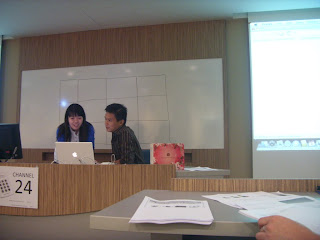As much as SiCKO provides a fertile ground for us to criticise the US healthcare system (and ours), it actually offers many beautiful possibilities that Singapore can look forward to.
Through comparisons with other countries. France, Canada, UK and even... Cuba.
Here, M. Moore chats with a doctor of the famous UK National Health Services (NHS) and finds out that in a system where no one is denied medical treatment in the UK and costs of medicine and treatment are either zero or just comfortably affordable, a doctor like the one above can live in a one million-pound home, enjoy fine wine, family time and practise ethical consulting all at the same time
In fact, under a new system of the NHS, a doctor gets paid more if he can get patients to stop smoking. How wonderful is that? In driving continual medical improvements through meaningful KPIs. No wonder the NHS is a strong case study of success in the field of knowledge management, and other academic disciplines.
In France, Michael Moore found out you can even tap on the French government to provide nannies for your baby and well, do your own laundry. The people's welfare put at heart. In the film, Moore shadowed a government-paid mobile doctor who went around Paris performing housecall duties to ordinary folks ill at home. I remember one time, a friend of mine had her elderly landlady suffering in great pain and immobility. She called the neighbourhood doctor (HDB) and was told firmly: "You have to call the ambulance, we don't provide such services."
You mean to say, if someone within a 1 km radius of your clinic is immobile and needs resuscitation (or even revival for life-and-death cases), your doctor will not come to save a life?!?!
Of course, many or in fact the Singapore government may argue that welfarism of this kind breeds complacency and over-reliance on government resources, we are for workfarism. But we would say that real world outcomes have shown that, the dichotomy in the welfare the French people and Singaporeans receive in terms of healthcare is so vast. Self-sufficiency is good but more government help is appreciated--it alleviates so much anguish and stress.
There's one place under the purview of the US government where medical facilities are accessible and guaranteed--ironically, the Guantanamo Bay where terrorists are imprisoned. As the film suggests, this place is better than any place on the mainland where basic healthcare services are concerned. On the premise of international human rights, even terrorists who perpetuated 9/11 receive better care than Americans.
The lady above featured in SiCKO is a 9/11 heroine and through rescue work on Ground Zero, she has been suffering severe bronchial damage due to inhaling waste, debris and dust. You would imagine that a self-sacrificing heroine like her should deserve free healthcare services in the States but no, she struggled, and had to move out of her city home to somewhere more affordable. Compare she... and the Guantanamo terrorists.

And in a touching turn to the film, Moore brings the individuals denied of health services featured in his documentary to nearby Cuba in search of medical treatment. He finds the insulting cheap prices of the same medicine in Cuba and finds medical treatment affordable, available for these victims of America's healthcare system. He brings 9/11 heroes to a local fire department where they are recognised and respected in deference for their rescue work. A totally different treatment from what they got in the States. Here, the heroes exchange handshakes and heartwarming hugs with the firemen.
Michael Moore asks in his film: "Who invented his system?" (Read: ridiculous healthcare system)
And this post harkens back to our mentions of a strained Singapore population; Singaporeans, many of whom through a frugal approach to life walk on a tightrope, maintain self-sufficiency but at the end of the day, are driven to fatigue and depression because of the many expectations, and the many roles they play. Over the years, the rich-poor divide has widened very greatly in the city-state. Like the CEOs of US insurance companies who became/are billionnaires and milk the firms in their some 3-4 years of stint, our rich has become ultra rich and the sandwiched portiion of the middle class are struggling with caregiving, paying for medical bills--and with juggling with their full-time jobs.
Yes, Singapore is an Asian country and we need not model ourselves after Western healthcare, welfare-oriented models but surely we have a mature health market and surely, a
little bit from the Republic can help the needy
so much. We all need a break.































